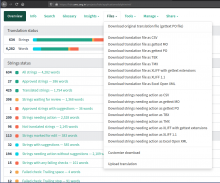This task is for the evaluation of a web-based translation system as discussed and proposed on several threads in the mailing list and a Phabricator ticket.
This task is thought to be a centralized point of information gathering and discussion for a web-based translation system. Thus hopefully the current fragmented state of discussions about it can be all summarized at one point.
Please feel free to edit this description with more relevant information and requirements. Ideally if there are different views on a point try to reach consenseus in the comments and afterwards add it to the description.
Why?
Having a web-based translation system makes contributions more streamlined (less tools) and easier for new contributors. Ideally it leads to a larger base of translators for KDE software.
Objections
- Might not show the expected impact on contributors (1, 2)
- Might be problematic with a large project (1, 2, 3)
- Possible decrease of quality or more effort to ensure quality (1, 2, 3)
Requirements
- Compatibility with an offline workflow (1, 2)
- Integration to work with multiple branches (either by the tool itself or by some other mechanism like PO Summit) (1)
Possible solutions
This is a list of possible solutions. The order should try to reflect the suitability of them with the most suitable ones at the top of the list. Also note that it is preferred (probably also required) that they are open source.
- Weblate - Should work with GitLab (docs-1, docs-2) or SVN (docs-1). Claims to support branches (docs-1). Reports of successful usage: Trinity Desktop Environment, KDE Malayalam localization team (link to their documentation).
- Pontoon from Mozilla, seems to be mostly focused on their workflow
- Pootle
- Zanata (no updates in their code repository - https://github.com/zanata/zanata-platform for almost two years, seems to be abandoned)
- Different approach, but has been suggested several times: Damned Lies (1, 2, 3)
Reference to an old summary of a previous approach
